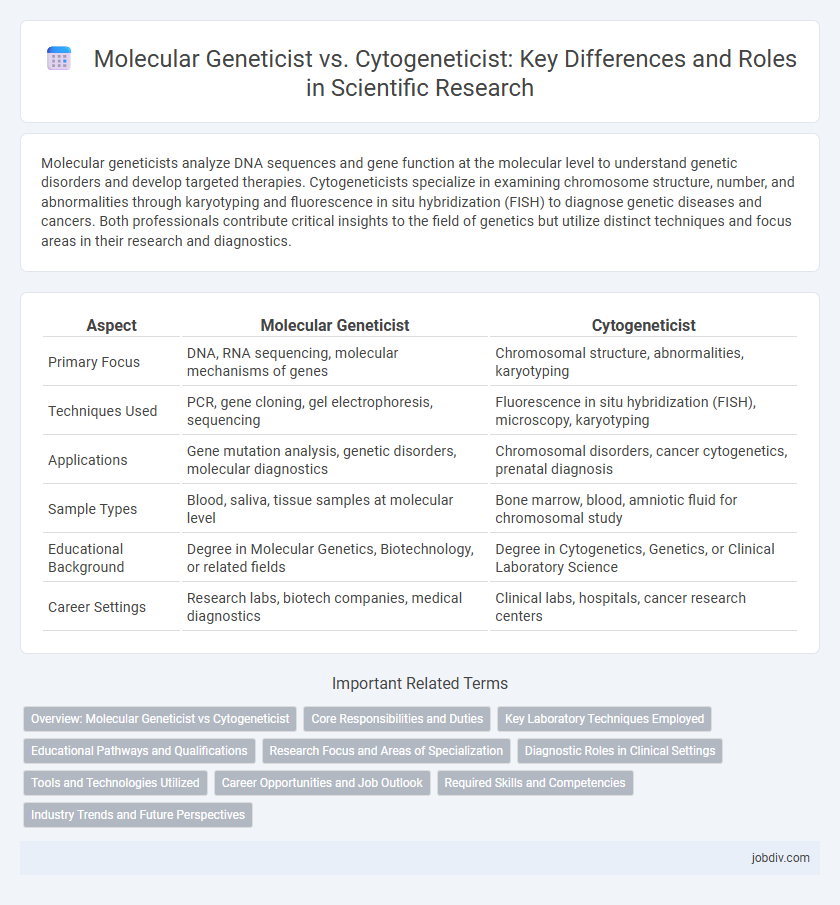Molecular geneticists analyze DNA sequences and gene function at the molecular level to understand genetic disorders and develop targeted therapies. Cytogeneticists specialize in examining chromosome structure, number, and abnormalities through karyotyping and fluorescence in situ hybridization (FISH) to diagnose genetic diseases and cancers. Both professionals contribute critical insights to the field of genetics but utilize distinct techniques and focus areas in their research and diagnostics.
Table of Comparison
| Aspect | Molecular Geneticist | Cytogeneticist |
|---|---|---|
| Primary Focus | DNA, RNA sequencing, molecular mechanisms of genes | Chromosomal structure, abnormalities, karyotyping |
| Techniques Used | PCR, gene cloning, gel electrophoresis, sequencing | Fluorescence in situ hybridization (FISH), microscopy, karyotyping |
| Applications | Gene mutation analysis, genetic disorders, molecular diagnostics | Chromosomal disorders, cancer cytogenetics, prenatal diagnosis |
| Sample Types | Blood, saliva, tissue samples at molecular level | Bone marrow, blood, amniotic fluid for chromosomal study |
| Educational Background | Degree in Molecular Genetics, Biotechnology, or related fields | Degree in Cytogenetics, Genetics, or Clinical Laboratory Science |
| Career Settings | Research labs, biotech companies, medical diagnostics | Clinical labs, hospitals, cancer research centers |
Overview: Molecular Geneticist vs Cytogeneticist
Molecular geneticists specialize in analyzing DNA sequences to identify gene mutations and hereditary disorders using techniques like PCR and gene sequencing. Cytogeneticists focus on chromosomal abnormalities by examining chromosome structure and number through karyotyping and fluorescence in situ hybridization (FISH). Both fields are integral to genetic diagnostics but differ in their scope: molecular genetics targets gene-level changes, whereas cytogenetics emphasizes chromosomal alterations.
Core Responsibilities and Duties
Molecular geneticists analyze DNA, RNA, and protein sequences to identify genetic mutations and understand gene functions relevant to inherited diseases and molecular diagnostics. Cytogeneticists specialize in examining chromosomes through karyotyping and fluorescence in situ hybridization (FISH) to detect chromosomal abnormalities linked to genetic disorders and cancers. Both professionals collaborate in clinical laboratories to provide accurate genetic information crucial for patient diagnosis, treatment planning, and genetic counseling.
Key Laboratory Techniques Employed
Molecular geneticists utilize polymerase chain reaction (PCR), DNA sequencing, and gene cloning to analyze genetic sequences and mutations at a molecular level. Cytogeneticists focus on karyotyping, fluorescence in situ hybridization (FISH), and comparative genomic hybridization (CGH) to examine chromosomal abnormalities and structural genome alterations. Both disciplines employ advanced microscopy and bioinformatics tools to interpret genetic and chromosomal data for diagnostic and research applications.
Educational Pathways and Qualifications
Molecular geneticists typically require a Ph.D. in molecular genetics or a related field, emphasizing training in DNA sequencing, gene expression, and molecular biology techniques. Cytogeneticists often pursue a master's or Ph.D. in genetics or cytogenetics, with specialized knowledge in chromosome analysis, karyotyping, and fluorescence in situ hybridization (FISH). Both professions demand rigorous laboratory experience and certifications such as the American Board of Medical Genetics (ABMG) for clinical practice.
Research Focus and Areas of Specialization
Molecular geneticists concentrate on analyzing DNA sequences, gene expression, and mutations to understand genetic disorders at the molecular level, specializing in techniques like PCR, gene sequencing, and molecular cloning. Cytogeneticists specialize in studying chromosomal structures, abnormalities, and karyotyping to diagnose genetic diseases related to chromosomal defects such as aneuploidies and translocations. Both fields contribute to genetic research, with molecular genetics focusing on gene-level variations and cytogenetics emphasizing chromosomal variations and structural changes.
Diagnostic Roles in Clinical Settings
Molecular geneticists analyze DNA sequences and gene mutations to diagnose inherited disorders, enabling precise identification of genetic abnormalities at the molecular level. Cytogeneticists focus on chromosomal patterns and structural anomalies using karyotyping and fluorescence in situ hybridization (FISH) techniques to detect conditions such as aneuploidies and translocations. Both specialties are integral in clinical diagnostics, with molecular geneticists addressing gene-level variations and cytogeneticists identifying chromosomal aberrations for comprehensive genetic evaluation.
Tools and Technologies Utilized
Molecular geneticists primarily use polymerase chain reaction (PCR), next-generation sequencing (NGS), and CRISPR-Cas9 gene editing to analyze and manipulate DNA sequences at the molecular level. Cytogeneticists rely on karyotyping, fluorescence in situ hybridization (FISH), and spectral karyotyping to visualize chromosomal abnormalities and structural variations in cells. Both specialties utilize advanced microscopy and bioinformatics software for data analysis, but their core tools reflect distinct focuses on molecular sequences versus chromosomal architecture.
Career Opportunities and Job Outlook
Molecular geneticists primarily work in research and clinical settings analyzing DNA sequences and genetic mutations, with career opportunities expanding in personalized medicine and biotechnology industries. Cytogeneticists focus on chromosomal analysis to detect genetic disorders, often employed in diagnostic laboratories, hospitals, and prenatal testing centers. Job outlooks for both professions are strong, driven by advancements in genetic technologies and increased demand for genetic testing in healthcare and pharmaceutical research.
Required Skills and Competencies
Molecular geneticists require expertise in DNA sequencing, polymerase chain reaction (PCR), and bioinformatics tools to analyze genetic mutations at the molecular level. Cytogeneticists must possess strong skills in chromosomal analysis, fluorescent in situ hybridization (FISH), and karyotyping to detect chromosomal abnormalities. Both roles demand proficiency in laboratory techniques, data interpretation, and familiarity with genetic databases, but molecular geneticists emphasize molecular diagnostics while cytogeneticists focus on chromosomal structure and function.
Industry Trends and Future Perspectives
Molecular geneticists are increasingly utilizing next-generation sequencing technologies to advance personalized medicine and gene editing applications, reflecting robust growth in biotechnology and pharmaceutical industries. Cytogeneticists focus on chromosomal analysis technologies, with emerging trends in automated imaging and AI-driven karyotyping enhancing diagnostic precision in oncology and prenatal testing. Future perspectives highlight integration of multi-omics data across both fields, driving innovations in targeted therapies and predictive diagnostics.
Molecular Geneticist vs Cytogeneticist Infographic

 jobdiv.com
jobdiv.com